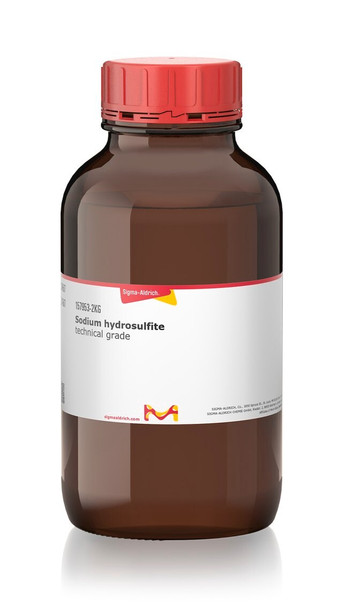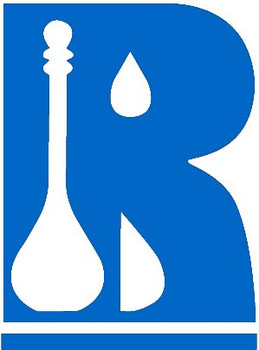Description
Sodium hydrosulfite, technical grade, 5G
Synonym(s):
Sodium hypodisulfite
Linear Formula:
NaO2SSO2Na
CAS Number:
7775-14-6
Molecular Weight:
174.11
EC Number:
231-890-0
MDL number:
MFCD00011640
PubChem Substance ID:
329750858
NACRES:
NA.21
PROPERTIES
grade
technical grade
Quality Level
200
Assay
≥82.5% (iodometric)
form
powder
pH
7-9 (20 °C, 50 g/L)
solubility
water: soluble(lit.)
cation traces
heavy metals: ≤0.002%
storage temp.
room temp
SMILES string
[Na+].[Na+].[O-]S(=O)S([O-])=O
InChI
1S/2Na.H2O4S2/c;;1-5(2)6(3)4/h;;(H,1,2)(H,3,4)/q2*+1;/p-2
InChI key
JVBXVOWTABLYPX-UHFFFAOYSA-L
General description
Sodium hydrosulfite (Sodium dithionite, Sodium hypodisulfite, Na2S2O4) is a white crystalline sodium salt. It decomposes in the presence of atmospheric oxygen to afford sodium hydrogen sulfate. It has been prepared by reducing sodium hydrogen sulfite in sulfurous acid solution with zinc.[1] It is widely used for the decolorization prior to dyeing of cloths in the textile industry.[2]
Application
Sodium hydrosulfite may be employed as a reducing agent for the reduction of graphite oxide in a study.[3]
Sodium hydrosulfite has been used as a fluorescent quenching agent in the encapsulation of polynucleotides via production of asymmetric nanoparticles.[4] It has also be used in the form of buffer for the elution of probe labelled proteins involved in the indentification of cellular targets of covalent kinase inhibitors via mass spectrometry method (MS).[5]
Sodium hydrosulfite has been used as a fluorescent quenching agent in the encapsulation of polynucleotides via production of asymmetric nanoparticles.[4] It has also be used in the form of buffer for the elution of probe labelled proteins involved in the indentification of cellular targets of covalent kinase inhibitors via mass spectrometry method (MS).[5]
SAFETY INFORMATION
Pictograms
GHS02,GHS07
Signal Word
Danger
Hazard Statements
H251 - H302 - H319
Precautionary Statements
P235 - P264 - P270 - P280 - P301 + P312 - P305 + P351 + P338
Hazard Classifications
Acute Tox. 4 Oral - Eye Irrit. 2 - Self-heat. 1
Supplementary Hazards
EUH031
Storage Class Code
4.2 - Pyrophoric and self-heating hazardous materials
WGK
WGK 1
Flash Point(F)
Not applicable
Flash Point(C)
Not applicable





